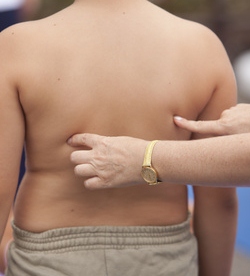
HBO Turns its Lens on Childhood Obesity
My hat is off to HBO for the media blitz about obesity for the past couple of weeks.  One episode of its four-part documentary series The Weight of the Nation (available for free viewing at http://theweightofthenation.hbo.com) focused on obesity in children, a very touchy subject for a lot of families.
One episode of its four-part documentary series The Weight of the Nation (available for free viewing at http://theweightofthenation.hbo.com) focused on obesity in children, a very touchy subject for a lot of families.
As Margo Wootan, director of nutrition policy at the Center for Science in the Public Interest, says in the film, “Often parents feel like they’re failures, they’re not doing a good enough job to get their kids to eat well, and it’s important for them to just understand that there are all these forces working against them.” Some of those forces include:
1. Unhealthy foods at school – Kids and teens eat about half their daily calories at educational settings, where vending machines and a la carte options are gaining market share. A recent survey found that 80 percent of American voters would like to see national standards that limit sugar, salt and fat content of foods sold in schools, and the U.S. Department of Agriculture is expected to release a new set of proposed standards doing just that in the next few months.
In addition, the USDA’s new nutritional standards for school lunches will be phased in over the next three years, starting in the fall of 2012. How effective this will be is unclear – the vast majority of schools already fail to meet the current nutritional standards. To learn more about school foods, watch the video at the Kids’ Safe & Healthful Foods Project.
2. Marketing – The HBO video includes scarily impressive montages of clips from commercials for breakfast cereals, sodas, candy, cookies, fast food chains and the like. The experts use words like “predatory” and “deplorable” when they talk about these ads, $1.5 billion worth a year.
3. TV viewing – Kids who watch more TV tend to be less active, and often they snack while watching, but they also see more of those insidious ads, and some experts believe this is the bigger problem. Perhaps the most at-risk children are those who have a TV in the bedroom or another room where they watch without an adult to temper the effects of the ads and explain to them what marketing really is.
4. Household habits – Most of us parents are not stellar examples of healthy eating, and it can be really hard to practice what we preach when it comes to veggies and whole grains.
5. Lack of exercise at school – The recommendation is that children engage in active play for 60 minutes every day for optimal health. My kids’ school gives kindergarteners 30 minutes of recess a day and older grades 15. Yes, 15! That rivals my sedentary day at a desk. And they only get one physical education class per week. Unfortunately, this is perfectly in line with Missouri standards.
But there are bright spots: On Tuesday, May 15, three fifth-grade students from the after-school soccer and poetry program America SCORES St. Louis visited the White House for a soccer clinic with First Lady Michelle Obama and the Major League Soccer champions LA Galaxy. The program’s results are impressive: America SCORES St. Louis participants receive 10 times more exercise than the national average, and 7 out of 10 participants who start out overweight achieve a normal weight within one year.
6. Cheap, ubiquitous, lousy food choices– Government policies are one factor in the rise of high-fructose corn syrup and other cheap, unhealthy ingredients. But we as a society aren’t off the hook, either, because we all crave the grease and sweetness of low-nutrient, high-calorie foods. And once in a while, that’s OK. It’s when those foods out-compete healthy options day after day that children gain weight. The Healthy Eating Index tracks what children eat, along with the factors that contribute to their diets. One of its findings is that 9.6 million children live in households where getting enough food is a struggle – so it’s no surprise that these families may choose to spend their limited income on high-calorie-for-per-dollar processed foods.
7. Juice and sports drinks– Yes, juice has vitamins, but it also has pretty much the same amount of sugar as the same size serving of soda. Sports drinks are likewise full of sugar, and high amounts of sodium. If your kids drink juice at all, limit it to once a day. But it’s healthier to give them whole fruits instead. And nix sports drinks all together, right along with soda. And don’t even get me started on the worst offenders, frapuccinos and other caffeinated, high-calorie drinks.
Having the deck stacked against our kids like this should be a call to action to all of us, whether or not ours are among the 1 in 3 children who are overweight or obese. These organizations offer fact sheets and tips to get you started:
• Tips for Acting Boldly to Change Diet and Exercise for Kids (American Psychological Association)
• Together Counts (Healthy Weight Commitment Foundation)
• HealthyChildren.org (American Academy of Pediatrics)
• Kids Eat Right (Academy of Nutrition and Dietetics)
• Let’s Move! (White House initiative)
By Amy De La Hunt, Health Blogger for SmartParenting

Amy De La Hunt is a journalist and editor who lives in the St. Louis metro area and works across the country as a writer, copy editor, project manager and editorial consultant on everything from fiction books to monthly magazines to blog posts. When she's not chauffeuring her teenage sons to activities, Amy is an enthusiastic amateur cook, landscaper, Latin dancer and traveler. Follow Amy on Instagram @amy_in_words




















